.svg)

.svg)
.svg)
.svg)
.svg)
.svg)
.svg)
.svg)
.svg)



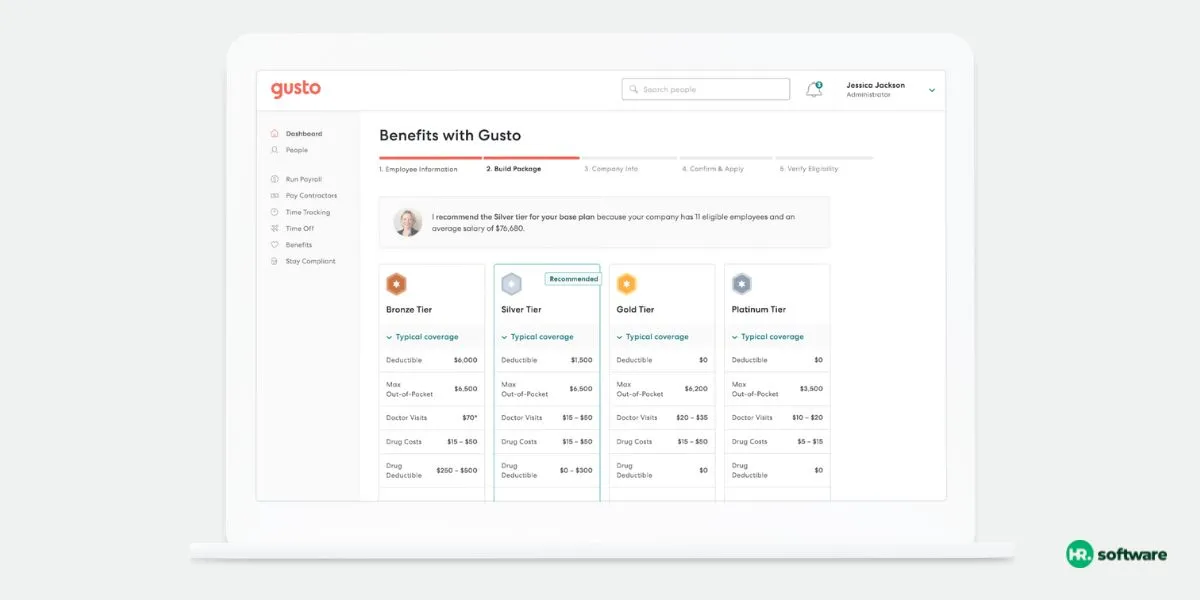
Gusto began as a U.S.-focused payroll provider and has steadily expanded into global markets. It now supports international contractors and, through partnerships, offers solutions for distributed employees. The platform is known for its intuitive interface, ease of use, and quick onboarding, making it an excellent choice for startups and SMBs exploring remote hiring for the first time. While it may lack advanced enterprise features, it provides a clean and user-friendly experience that streamlines payroll for smaller teams.
Pricing: From $49/month base fee + $6 per user.
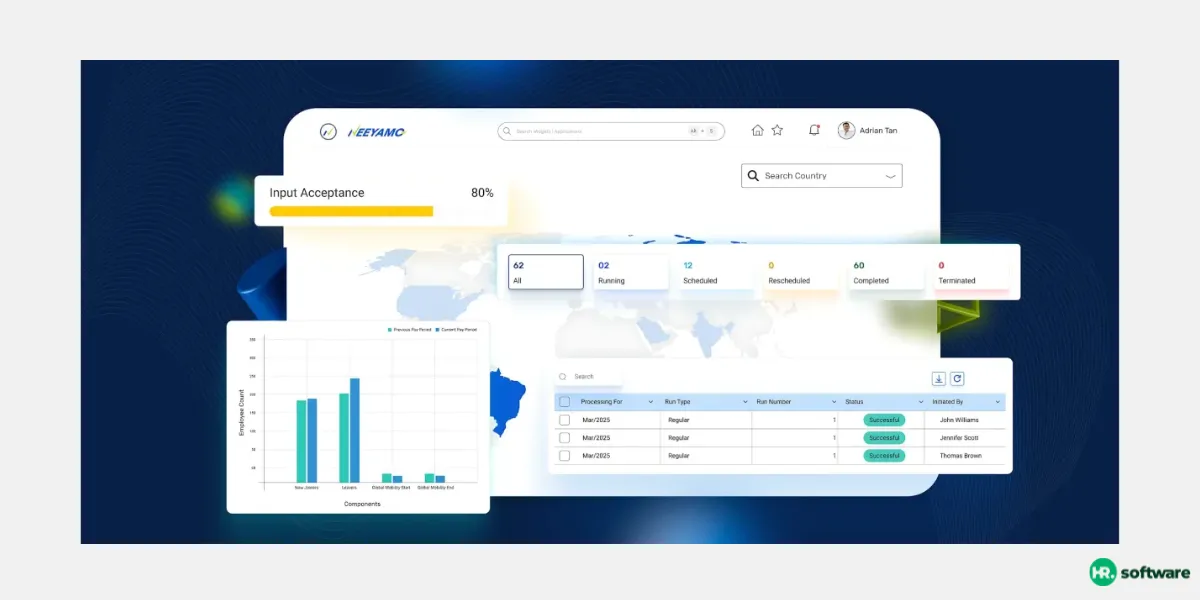
Neeyamo is a global payroll and HR provider that serves some of the world’s most complex and compliance-heavy industries. Covering over 160 countries, it specializes in automation, GDPR alignment, and statutory benefits management. Neeyamo is particularly strong for organizations that need both scale and compliance sophistication, such as healthcare, finance, and manufacturing. It is well-suited for mid-sized to large enterprises with rapidly expanding remote workforces.
Pricing: Starts at approximately $30 per employee/month, with costs scaling for premium services.

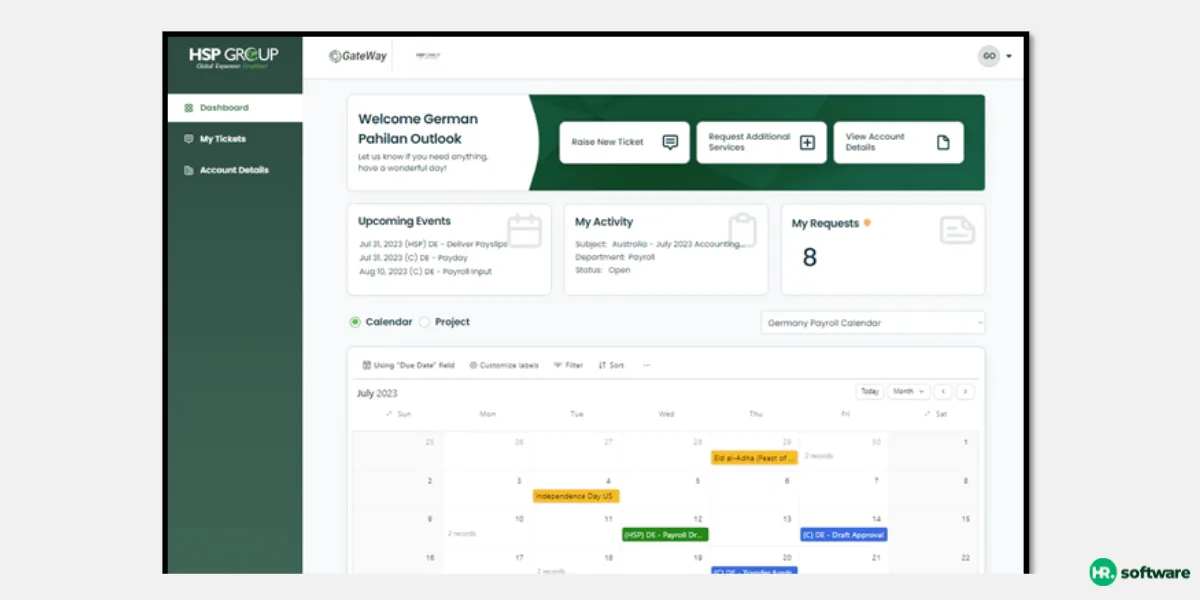
HSP Group offers GateWay, a unique command center combining payroll, compliance, and entity management. This makes it particularly attractive to enterprises operating across multiple jurisdictions where legal governance is just as important as payroll delivery. The platform is designed for complex organizations needing centralization and control over payroll, tax compliance, and legal obligations. While its enterprise focus makes it less accessible for startups, its integrated model appeals to businesses with layered international operations.
Pricing: Available via custom enterprise contracts, based on regions and complexity.

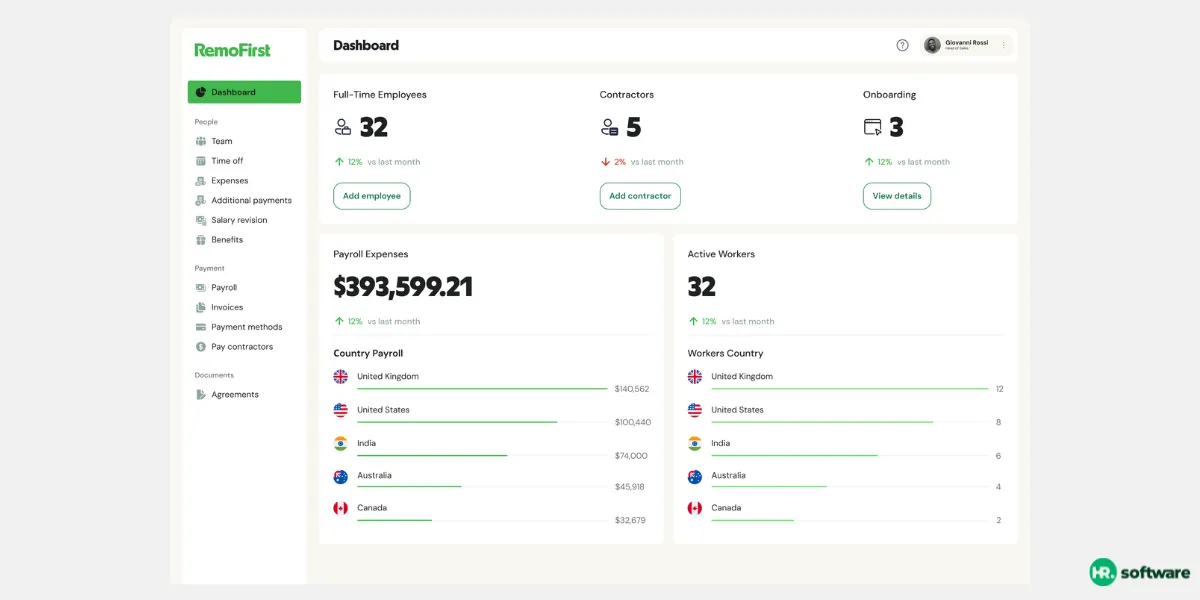
RemoFirst is a newer payroll provider built specifically for remote-first teams. It emphasizes simplicity and affordability while covering 150+ countries for contractor and employee payments. RemoFirst offers local currency support, automated workflows for time and leave management, and consolidated invoicing. While it may lack the brand power and extensive integrations of larger players, its modern, lightweight design makes it appealing for startups and SMEs expanding internationally.
Pricing: Based on custom quotes, typically cost-effective for SMBs.

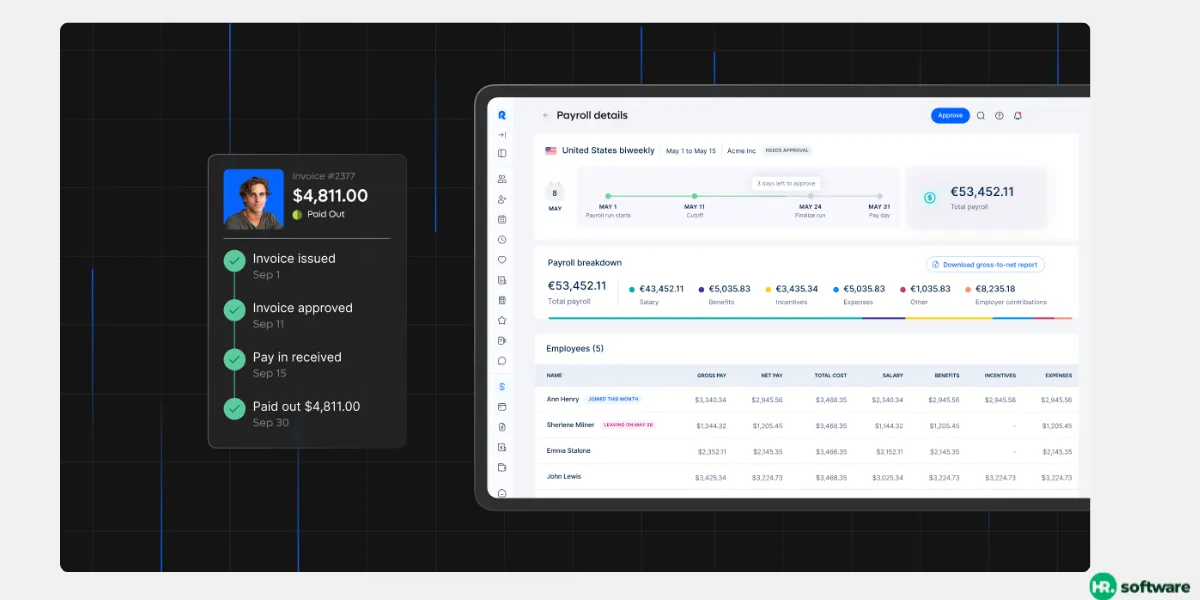
Remote is one of the most well-known platforms built specifically for distributed workforces. It combines payroll, HRIS, benefits, and compliance in a single system. Remote also offers full Employer of Record (EOR) services, allowing companies to hire employees without setting up local entities. Its clean interface, compliance-first design, and contractor/employee support make it a go-to solution for remote-first companies of all sizes. While pricing can scale quickly, its coverage and flexibility make it a strong contender for businesses that prioritize compliance and employee experience.
Pricing: Offered via custom enterprise pricing, depending on workforce and locations.

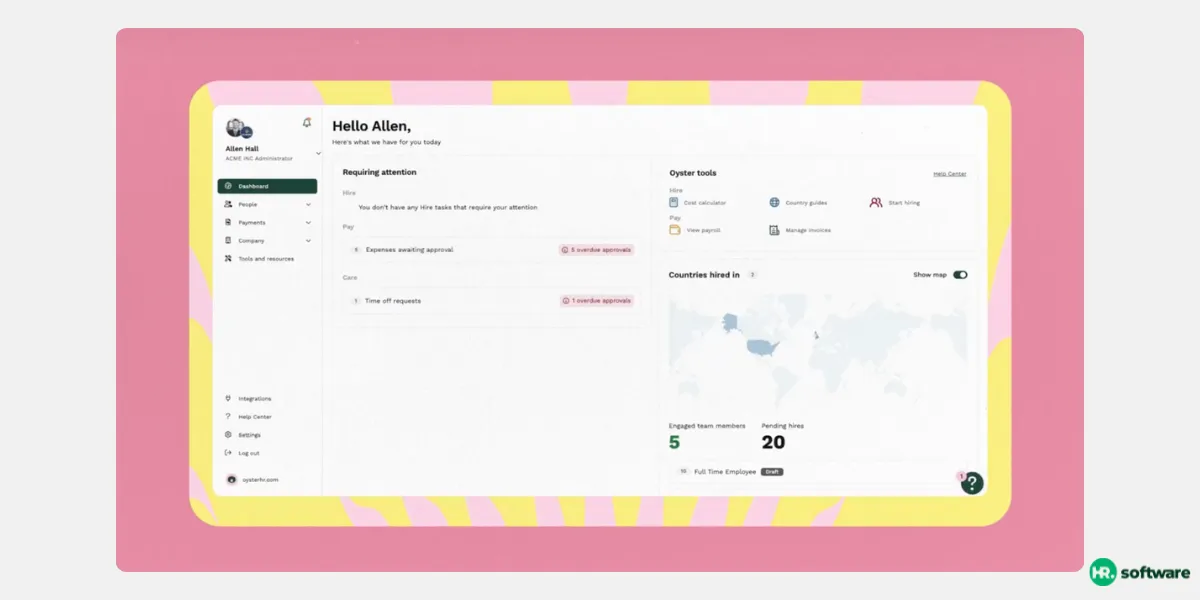
Oyster HR focuses on simplifying global hiring and payroll for remote-first companies. It is known for its transparent pricing and strong contractor support, making it particularly useful for startups and mid-sized teams. Oyster handles compliance, payroll, and benefits while providing easy-to-use dashboards and employee portals. Coverage is smaller than that of Neeyamo or Remote, but the platform is growing quickly and has earned a reputation for reliability and customer support.
Pricing: Contractor plan ~$29/month; Employee plan ~$499/month.

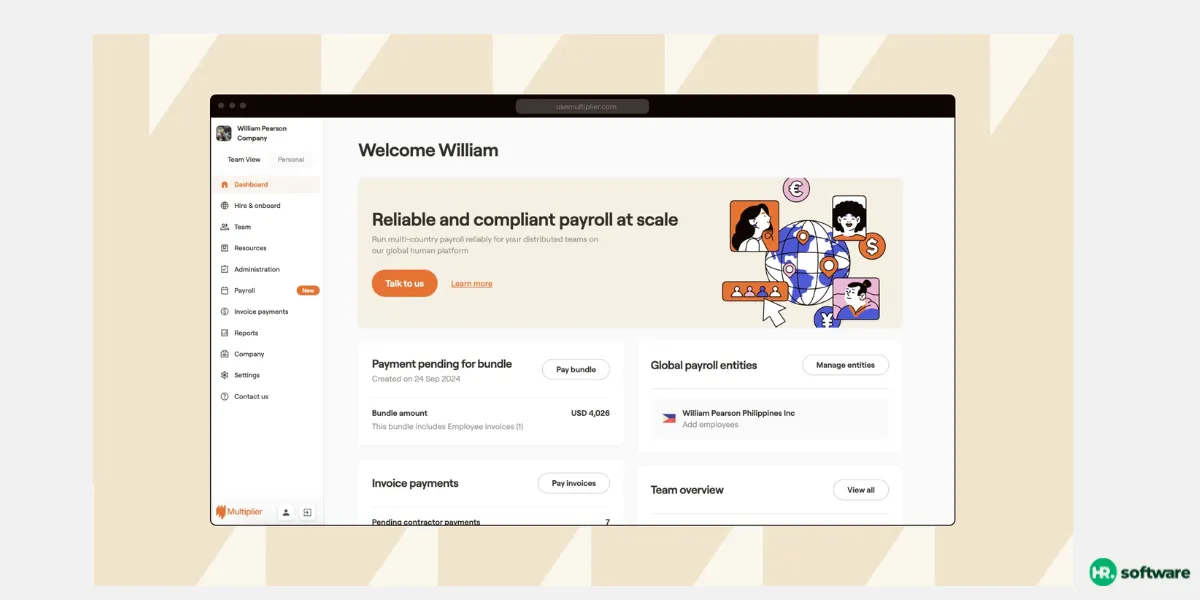
Multiplier is a modern SaaS payroll and employment platform built with distributed teams in mind. It offers compliance automation, benefits integration, and EOR services, covering 150+ countries. Designed for usability, it allows businesses to onboard, pay, and manage employees with minimal friction. While its interface is clean and easy to use, some users note limitations in scalability for very large teams. Still, it strikes a strong balance between affordability and compliance.
Pricing: From ~$40 per employee/month.

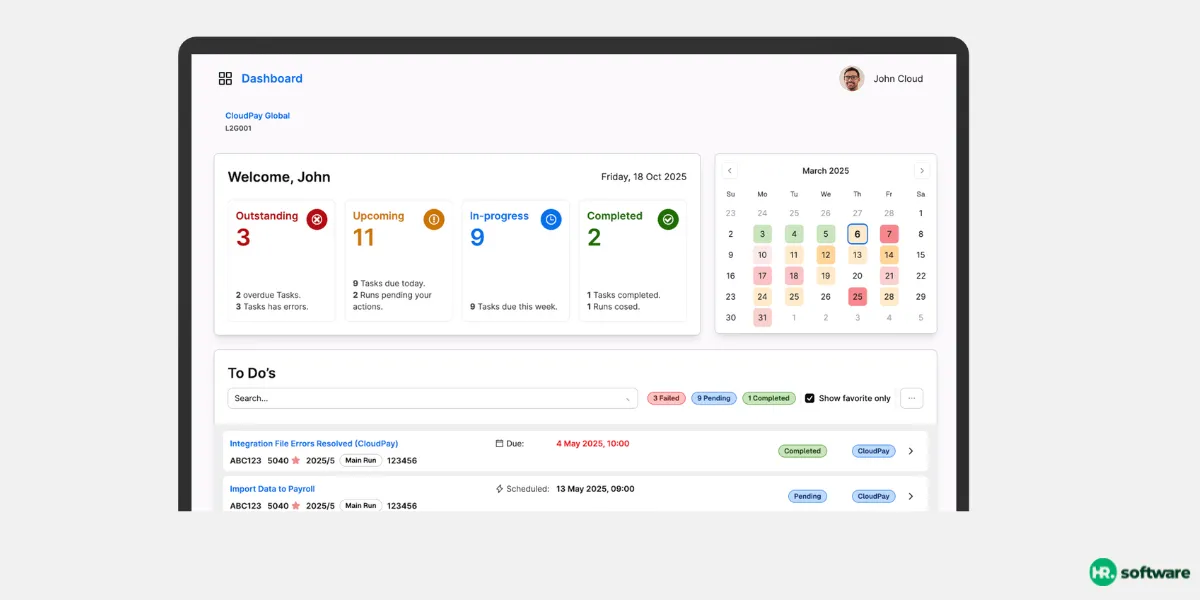
CloudPay is an enterprise-grade payroll platform designed for global organizations with large, distributed teams. It integrates payroll with treasury and payment systems, making it strong in multi-currency salary delivery. CloudPay also emphasizes compliance and provides advanced analytics for finance and HR teams. It is best suited for mid-market to enterprise clients, as its onboarding process can be complex and resource-intensive for smaller businesses.
Pricing: Offered via custom contracts, mid-market to enterprise pricing.

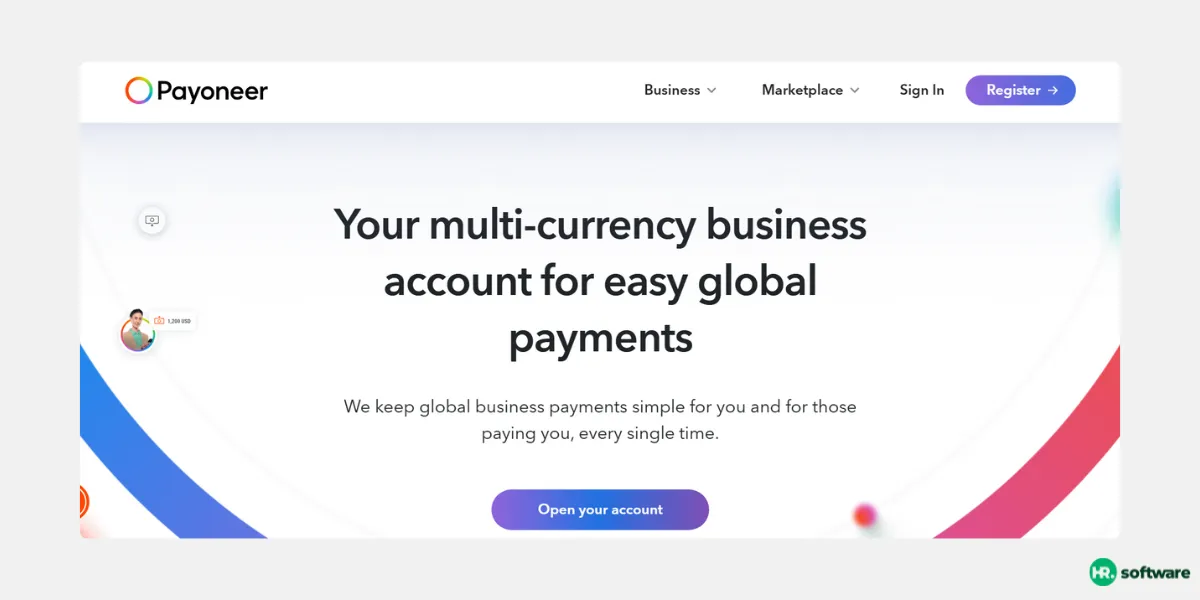
Payoneer is primarily a payments platform but has expanded into payroll for remote teams, especially contractor-heavy organizations. It specializes in fast cross-border payments, supporting multiple currencies and offering low transaction fees compared to banks. While it lacks the HR, compliance, and EOR functionality of full payroll platforms, it remains a cost-effective solution for businesses paying international freelancers and contractors.
Pricing: Transaction-based fees, typically 1–3% per transfer.
Payroll software for remote teams ensures accuracy, reduces compliance risks, improves employee trust, and provides real-time visibility across global operations.
Payroll software is important for distributed teams for the following reasons:
In short, payroll software for remote teams is not just a technology upgrade—it is a safeguard against risk, a driver of efficiency, and a foundation for global trust.
The right payroll platform depends on your company’s size, compliance needs, budget, and global footprint. Smaller teams may benefit from lightweight tools, while enterprises require platforms with advanced compliance and EOR services.
By evaluating these criteria, businesses can shortlist tools that align with their scale, risk profile, and future expansion plans.
Remote teams thrive on trust, and payroll is at the core of that relationship. The right global payroll platform ensures accurate, compliant, and timely payments while simplifying HR and finance workflows. From contractor-focused solutions like Payoneer to enterprise-grade systems like CloudPay and HSP Group, each tool has its strengths.
When choosing a provider, consider your team’s size, compliance requirements, and integration needs. Start small—pilot one or two platforms with a segment of your workforce. The right system will not only reduce risks but also improve employee experience and support long-term global growth.
What payroll features matter most for remote teams?
Key features include multi-currency payments, automated compliance, contractor and employee support, benefits integration, and employee self-service portals.
Do I need separate software for contractors vs employees?
Not always. Platforms like Remote, Oyster HR, and Multiplier support both. However, contractor-heavy teams may prefer specialized solutions like Payoneer.
How much does global payroll software cost?
Costs vary from $30–$50 per employee/month for mid-market tools (e.g., Neeyamo, Multiplier) to $499+ per employee/month for full EOR solutions like Oyster. Transaction-based platforms like Payoneer charge 1–3% per transfer.
Is compliance better handled in-house or via software?
Software with in-country experts and automated tax engines significantly reduces compliance risk. In-house management is only viable for single-country or low-complexity operations.
Can remote teams use payroll tools without legal entities abroad?
Yes—tools like Remote, Oyster HR, and Multiplier offer EOR services so you can legally hire employees without setting up entities.
How can I ensure payroll data security across borders?
Choose providers with certifications like GDPR, SOC 2, and ISO 27001. Also, enforce security features like multi-factor authentication and role-based access control.